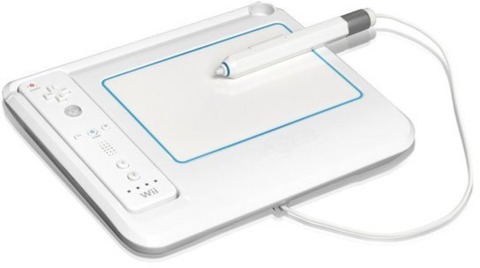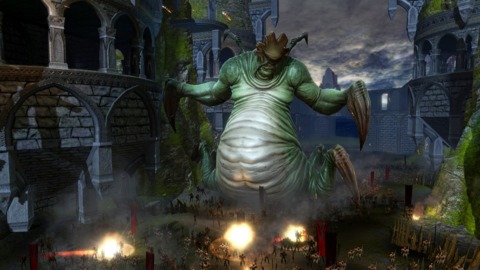Is THQ on the verge of collapse?
THQ took uDraw to task for its recent travails, but the ill-fated peripheral is just the latest example of the publisher failing to adapt to a changing industry.
I'm not sure how many of you all realized this, but THQ's stock is down about 90 percent over the past 12 months, having closed trading today at 60 cents per share. Pretty bad. Not so bad if you consider the stock is down 98 percent from its April 2007 high, when THQ was trading at more than $36 a share on the NASDAQ exchange. Now, NASDAQ doesn't want anything to do with the company, threatening to delist the publisher if it can't raise its share price above $1 before July 23.
But this story started prior to the NASDAQ drama and last week's uninspiring holiday quarter earnings report. We recently received an anonymous letter purporting to represent "current and ex-employees, shareholders, and the public," and signed by "The Formerly Mismanaged." It's lengthy--and unsubstantiated--so I'm not going to repost it here. If you're interested, though, I've posted it here. (THQ had not responded to a request for comment on this letter as of press time.)
Disgruntled is the tone, and the grievances are damning. To briefly recount the author's points, THQ is being, and has been for years, mismanaged into oblivion. The author is particularly incensed about the uDraw tablet, which found a measure of success on the Wii in 2010 but was DOA for the Xbox 360 and PlayStation 3 in 2011. Nearly three dozen--or what the author calls an entire business unit--were sacked as a result.
Humorously, in a gallows sense of the term, The Formerly Mismanaged painted a rosier picture than the actual circumstances of the matter. THQ said last week that, combined with its exit from the kids' games business and backing off of licensed properties, 10 percent of the company had been laid off, or about 240 people.
What's more, THQ management overestimated uDraw's sales potential by $100 million. Considering the uDraw cost $80 when it launched in November, THQ missed its guess by a cool 1.25 million units. Development on the tablet has ceased. All commitments are now settled. The uDraw disaster will be dealt with by lighting remaining inventory on fire and everyone speaking of it never again. You may remember this strategy from The Great HD-DVD Debacle of 2008.
THQ has for years been following the same formula of chasing yesterday's home runs (in this case, high-priced peripherals), of swinging so hard, so confidently, that it routinely dislocates its shoulder on strike three.We briefly entertained the idea of naming last week's earnings report story "THQ blames uDraw for everything," but who are we kidding. THQ has for years been following the same formula of chasing yesterday's home runs (in this case, high-priced peripherals), of swinging so hard, so confidently, that it routinely dislocates its shoulder on strike three. And the cycle has played out in news headlines countless times.
To illustrate the point, let's hone in on the last time THQ actually looked like it knew what it was doing. For the fiscal year ended March 31, 2007, the publisher posted company-best profits of $64 million on revenues a little over $1.02 billion. It was the 12th consecutive fiscal year that the publisher grew its annual revenues.
On to fiscal 2008, its revenues streak remained alive, just barely, at $1.03 billion, but that company-best profit reversed to losses of $35 million. The streak died at 13, as revenues for fiscal 2009 came in at $830 million and losses mounted to a staggering $431.1 million. The ship stabilized in fiscal 2010, thanks largely to the breakout success of UFC Undisputed, with revenues of $899.1 million and losses narrowed to $9.6 million. And then the bottom fell out, again, in fiscal 2011, when the company lost $136.1 million dollars on $665.3 million in revenue.
Here are a few things that happened in that period. THQ bought Juice Games and Paradigm Entertainment, developers of the Juiced and Stuntman franchises, respectively. THQ fired off new installments in both of those franchises. (And when I say fired off here, the image I want to convey is that of a drunk hunting cacti in the desert.) Both underperformed. THQ shut down Paradigm in 2008. After rebranding Juice Games as Digital Warrington, THQ shut the studio down in 2011. The Juiced and Stuntman franchises remain on hiatus.
In January 2008, THQ bought Big Huge Games, creator of the excellent Rise of Nations, and in the process picked up a role-playing game in development under the auspices of The Elder Scrolls IV: Oblivion lead designer Ken Rolston. A year and a half later, THQ sold Big Huge, after nearly killing the studio with a round of layoffs. Curt Schilling's 38 Studios is now releasing Rolston's RPG, Kingdoms of Amalur: Reckoning, in conjunction with EA this week. I have played it, and I'm happy THQ's stewardship didn't kill it.
THQ formed Kaos Studios in 2006. THQ expanded Kaos Studios in 2009. THQ released Kaos Studios' underwhelming Homefront in March 2011. THQ cut staff at Kaos Studios in April 2011. THQ closed Kaos Studios in June 2011.
Does the word transmedia mean anything to you? It's likely a word that Volition Inc. would like to kill with a very large bird, after the transmedia violation perpetrated the otherwise excellent Red Faction franchise. Alec Mason and co. are currently in cold storage, after THQ shelved the franchise following Armageddon's disappointing sales and the SyFy made-for-TV movie's disappointing existence.
There was that delightful moment back in 2008 where THQ had to actually articulate "making good games" as a goal it would strive for.
I could go on.
Here's an interesting corollary. Compare THQ's full-year revenues to the state of US game retail sales. According to The NPD Group, the US game industry's stat-tracking firm of record, the retail game industry peaked in 2008. THQ peaked in 2008, too. Viewed from this lens, THQ appears to be yet one more publisher that has failed to keep up with a changing game-industry landscape, where a connected, online experience is mandatory to survive.
By contrast, there are the similarly situated Activision and Electronic Arts, which have taken two different approaches to staying relevant in a connected world. Activision sold itself to French conglomerate Vivendi, and in the process, it opened itself up to Blizzard Entertainment's massively multiplayer online dollar-defecating ways. EA, on the other hand, put in the old-fashioned elbow grease to launch its own Steam competitor, Origin, and has become the industry leader in innovating post-release content strategies (a profitable, albeit yucky, thing). It also financed BioWare's Star Wars: The Old Republic, which appears to have cracked the MMO nut.
THQ's travails illustrate a fundamental, imperceptible shift in how the game industry now does business, one of those shifts that most people don't pick up on until after it happens. And in that sense, it's hard to fault THQ's executive team for not responding adequately to it. Until, of course, you look at their paychecks.
THQ's executive team--that is to say, its CEO; CFO; EVP of Core Games; EVP of Kids, Family, and Casual; and EVP of Global Publishing--combined to earn $4.92 million during the fiscal year ended March 31, 2011, according to SEC filings. (I'll save you some time: That was the year when net losses were $136.1 million and revenue was $665.3 million, the lowest since fiscal 2004.) Three of those execs forewent a bonus at least--and no, Martin, whose employment at THQ was immolated along with all those aforementioned uDraw tablets, wasn't one of them. Is it worse to pocket 50 large on a fad, or be the ones who view rickety success as worthy of a reward? But Occupy THQ is a rabbit hole for a different day.
THQ was able to maintain its business model in the retail spectrum. However, with the shift to digital, if the house hasn't fallen down yet, it's certainly on fire. Still, there is cause to believe that THQ may finally have the gist of it, albeit five years late and certainly behind the next big thing.
THQ expects to be a significantly smaller company going forward, intentionally so this time, projecting fiscal 2013 revenues of around $400 million. All future products will be developed with an always-on, always-connected bent, and THQ is doubling down on its core franchises, which is to say, those franchises aimed at the 14- to 35-year-old boy demographic. UFC Undisputed, Darksiders, Crytek's Homefront, Company of Heroes, Guillermo del Toro's inSane, Saints Row, Warhammer 40,000, Tomonobu Itagaki's Devil's Third, and the in-development game from former Assassin's Creed creative director Patrice Desilets.
Strong IP is no longer good enough.To be sure, that has the makings of a strong portfolio. Of course, EA's 2008 portfolio, which included the likes of Mirror's Edge, Rock Band, Mass Effect, Steven Spielberg's Boom Blox, Mercenaries 2, Crytek's Crysis Warhead, Left 4 Dead, Dead Space, and Will Wright's Spore also looked pretty damn good. By the end of that fiscal year, EA posted a net loss of $677 million on revenue of $3.65 billion. Strong IP is no longer good enough.
Do I have confidence that THQ can pull this turnaround off? Well, an exchange from THQ's post-earnings conference call last week was telling. When asked by Arcadia Investments analyst John Taylor what the company's contingency plan is, should the core games shift not pan out, president and CEO Brian Farrell responded:
"In terms of readjusting our strategy, the word we've used is adjusted. The whole 'building the core games strategy with a digital ecosystem around it' is something we've been talking about for a while. As I said in my prepared remarks, we were looking at uDraw as a bridge to this core and digital future, and that bridge turned out to be a plank that we walked off of. That said, it accelerated the need to go in this direction. We're very comfortable based on what's happened with Saints Row and WWE. If we continue to do that type of game going forward on the much lower cost structure and build the higher margin digital revenues around that, we're confident in the future."
As Taylor astutely pointed out, "The implication of that is fewer, bigger, which means the risk of failure is amplified as well." But all I heard was, "Plan B? What do you mean? This is Plan B."
Got a news tip or want to contact us directly? Email news@gamespot.com


Join the conversation